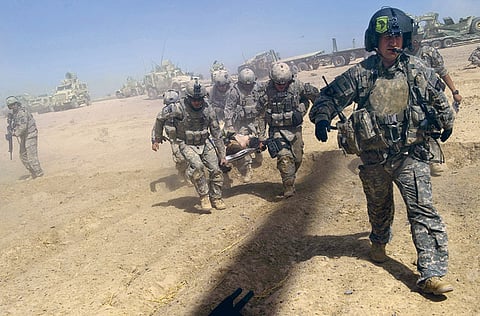Iran acknowledges 'assistance' for Afghanistan
Iran admits giving "assistance" to Afghanistan after Afghan leader Hamid Karzai reveals receiving bags of cash from Iran

Kabul: Iran acknowledged on Tuesday giving "assistance" to Afghanistan after President Hamid Karzai admitted receiving bags of cash from Tehran, sparking US concerns about its arch-foe's expanding influence.
Karzai insisted at a news conference in Kabul on Monday that the payments to his chief of staff - sometimes as much as $980,000 at a time - were transparent handouts for his presidential office.
"The Islamic Republic of Iran, as a neighbouring government, is deeply concerned about Afghanistan's stability, and has given much assistance for the reconstruction of Afghanistan," foreign ministry spokesman Ramin Mehmanparast said when asked to comment on Karzai's announcement.
"The Islamic Republic of Iran has done its part in helping Afghanistan rebuild and develop its economy and will do so in the future," Mehmanparast said, without elaborating on the form of the assistance.
The case has raised hackles in Washington, which is trying to quicken an end to years of war in Afghanistan, amid fears that Iran could be funding insurgents or trying to exploit anti-Western sentiment in the Kabul government.
White House deputy spokesman Bill Burton said: "I think the American people and the global community have... every reason to be concerned about Iran trying to have a negative influence on Afghanistan."
He said Iran had a responsibility to "ensure that Afghanistan is not a country where terrorists can find safe harbour, or where attacks can be planned on their soil".
There have been no diplomatic relations between Iran and the United States for three decades. Since America's post-9/11 wars, Iran has been concerned by a US military buildup on its eastern border, as well as to the west in Iraq.
Despite their rivalry, Washington and Tehran are both sworn enemies of the Sunni Taliban militia which ruled Kabul from 1996 until the 2001 US-led invasion of Afghanistan.
The New York Times reported on Saturday that Karzai's chief of staff, Umar Daudzai, received regular payments from Iran.
The paper cited officials as saying that the Iranian payments were intended to secure the allegiance of Daudzai, a former ambassador to Iran who consistently advocates an anti-Western line to Karzai and briefs him daily.
Karzai angrily denied that the payments were secret and likened them to financial assistance handed out by the United States to the Afghan government.
"We are grateful for Iranian help in this regard. The United States is doing the same thing. They're providing cash to some of our offices."
The Afghan president said payments by friendly countries had been "discussed" with former US president George W. Bush at Camp David, but it was not clear whether he had mentioned Iran explicitly.
Asked if the money came in bags, as reported, he said: "It does give bags of money yes, yes it does... it's all the same, let's not make this an issue."
The New York Times, citing unnamed officials, said millions of dollars go into a secret fund that Daudzai and Karzai have used to pay lawmakers, tribal elders and even Taliban commanders to secure their loyalty.
Iranian President Mahmoud Ahmadinejad denied accusations leaked in thousands of Pentagon files in July that Iran was funding the Taliban, who are on the rise across Afghanistan even as thousands more US troops pour into the country.
Iran was involved for the first time last week in international talks on the future of Afghanistan held in Rome and said it could help stabilise the country with US support.
Afghan political analyst Waheed Mujda said relations between Washington and Kabul, which have soured largely over rampant corruption within the Karzai government, had suffered as a result of the relationship with Tehran.
"This does damage the Afghanistan-US relationship. There is no transparency on how much money Iran has been giving to Afghanistan, and how and where it has been spent. This makes alarms go off in the White House," he said.
"It's a very sensitive and damaging issue on all sides. In Afghanistan, anti-US sentiment is taking shape especially after accusations against the Afghan president and Karzai's heated reactions to the West."



